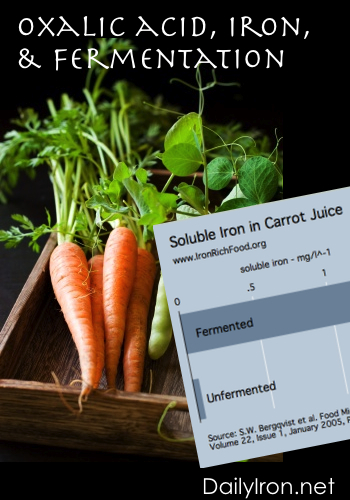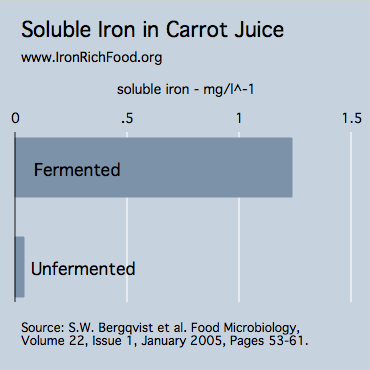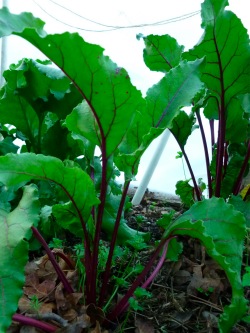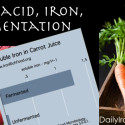 Q: “Does Fermentation Reduce Oxalic Acid in Food?”
Q: “Does Fermentation Reduce Oxalic Acid in Food?”
A: “You bet.”
With spring and summer gardens teaming with produce, more people have been interested in mineral inhibitors in vegetables. Last month I posted about the mineral inhibitor oxalic acid. The article is on the calcium site but the discussion applies equally to iron. Oxalic acid binds to minerals and reduces your absorption of both iron and calcium. Oxalic acid is also implicated in kidney stones. Garden greens tend to have high levels of this iron-binding substance.
We were interested in oxalic acid this spring because of our obsession with green soup (an obsession that lives on since I just had a bowl for breakfast). The greens we used were high in oxalic acid and based on research presented in the article, we chose to boil them first and discard the boiling water. A good portion of the oxalic acid is moved to the boiling water and then is discarded. Certainly, some of the benefits of the greens got poured out along with the oxalic acid, but we were eating so much of it we thought it wise to prevent kidney stones.
Out of the discussion came the question: “Does Fermentation Reduce Oxalic Acid in Food?”
First, this is not a question over which there are legions of food science dissertations. There simply is not a lot of literature on home fermentation.
 However, there is a nice little article that suggests fermentation is a great strategy to reduce oxalic acid. A 2005 study of carrot juice examined the soluble iron in fermented and unfermented juice and found the fermented carrot juice to be up to 30 times more absorbed than unfermented juice. The authors argue that it is the reduction in metal chelators (phytic acid and oxalic acid) that drives the change in availability of iron. They actually test for phytic acid and show that it is completely removed with fermentation. Carrots are known high oxalate foods and it is likely that removal of oxalates drives much of this added iron availability.
However, there is a nice little article that suggests fermentation is a great strategy to reduce oxalic acid. A 2005 study of carrot juice examined the soluble iron in fermented and unfermented juice and found the fermented carrot juice to be up to 30 times more absorbed than unfermented juice. The authors argue that it is the reduction in metal chelators (phytic acid and oxalic acid) that drives the change in availability of iron. They actually test for phytic acid and show that it is completely removed with fermentation. Carrots are known high oxalate foods and it is likely that removal of oxalates drives much of this added iron availability.
As a result, the evidence suggests that both fermentation and boiling are fairly effective strategies to reduce oxalic acid in your food. Of course, the key benefit of fermentation is that the food can stay raw, giving you all of the benefits of rawness with the mineral binders.
Should You Worry Or Bother?
The oxalic acid obsession is most important for people relying on oxalate foods for their mineral content or people prone to kidney stones. We took care to reduce oxalic acid in our green soups because we were making gallons of concentrated greenness. Some people have raw green smoothies every day with no issue at all. If that is you — fantastic. There is so much goodness in greens any way that you prepare them, that we all really need to find more ways to eat them that meet our own specific circumstances. Fermentation is just one possibility.
How Do You Ferment Vegetable Juice or Vegetables?
 You can ferment your juice or vegetables using a vegetable starter like Caldwell, saving a start from your first batch to inoculate subsequent batches.
You can ferment your juice or vegetables using a vegetable starter like Caldwell, saving a start from your first batch to inoculate subsequent batches.
You could ferment using whey as a starter. Many people have great success with whey. It is simple and worth a try. I don’t care for the ferments from whey personally.
For vegetable juice, I typically use a water kefir method using first ferment water kefir added to the vegetable juice in a process I describe here using fruit juice instead. It works well for vegetable juice too. I keep water kefir going regularly and so this is the best option in my home.
That said, I would drink high oxalate juice unfermented — I am not a slave to this method. If I were drinking it daily, I would ferment at least some of it, just as I boiled lambs quarters for our green soups. Your mileage may vary — you may need none of these methods, you may be so prone to kidney stones that you choose to avoid these foods entirely.
